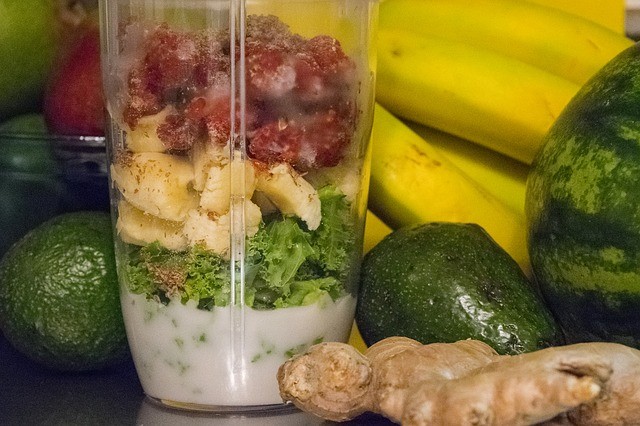The popularity of juicing began in the 1970’s but really took off in the 1990’s and is going strong today. Juice bars, juice machines and juice cleanses are all promoted as easy, delicious ways to boost your immune system and increase your overall good health. Proponents of juicing say it can aid in nutrient absorption, feed more good bacteria to your gut, allow you to experience a wider variety of fruits and vegetables, hide veggies from children and promote weight loss. The process extracts juice from fresh fruit and vegetables. The juice contains most of the vitamins, minerals and phytonutrients contained in the whole piece of fruit or vegetable. However, the whole piece contains the necessary healthy fiber we all need, and which is mostly lost through the juicing process.

Garrick Dee started his website to chronicle his journey through juicing. He believes that juicing can allow more nutrient absorption because the gut doesn’t need to digest all the fiber in whole fruits and vegetables. It allows you to consume a wider range of vegetables than you would normally eat thereby adding more nutrients and feeding good bacteria to your gut. 1/3 of our immune system is in our digestive tract so the key to a healthy body is a healthy gut. Hippocrates said, “All disease begins in the gut.” Dee also says that juicing can fight cancer, lower cholesterol, blood pressure and blood sugar levels along with detoxifying your body, giving you better skin and increasing athletic performance. For example, several world class athletes like Ryan Hall and the Auburn University football team swear by red beet juice.
Katherine Zeratsky, R.D., L.D. said in an article for the Mayo Clinic that “Juicing is not healthier than eating the whole fruit or vegetable.” There is no scientific evidence that juicing allows your body to absorb nutrients better and gives your gut a chance to rest from breaking down fiber. She also says there is no solid scientific proof that juicing reduces your cancer risk, increases your immune health, removes toxins or aids in digestion or weight loss. On the flip side, if you don’t like to eat the whole piece, juicing can be a fun way to add these to your diet. It gives you a chance to try our different fruits and vegetables you may never have tried. You can sneak veggies into your child’s fruit juices and mix and match varieties to your own taste. Chemotherapy and surgery patients as well as those with high blood pressure or high cholesterol can benefit from the ease of adding fruits and vegetables without the ‘work’ of eating.
Cleansing your way towards weight loss or toxin removal is also not without its controversy. Your liver and kidneys naturally perform the cleansing needed by your body. You can actually harm yourself with long-term juice cleanses because of the lack of fiber, proteins and fats. The idea that you can suppress your appetite by drinking juice before a meal can also be accomplished by drinking water.
It is important that you only juice what you intend to drink at that time as unhealthy bacteria can develop. Bottled, pasteurized juices are a wonderful alternative to fresh juice. Some pasteurized juices, like tomato juice can benefit from the pasteurization process. It is also important to be aware of sugar content or added sugars as weight gain, intentional or not can result. The recommended mix is 80% vegetable and 20% fruit juice in order to keep your sugar intake under the daily recommended amount. If that much vegetable juice doesn’t go down well, add lemon or a low-sugar green apple.

However you weigh in on this topic, helpful and fun or a lot of scientific nonsense, juicing by and of itself doesn’t appear to be hurtful. As always, variety and moderation are the key elements.
Eka Arifin has compiled a fun list of fruit and vegetable juices and their suggested benefits:
- Watermelon 90% water, very hydrating and contains antioxidants to help decrease chances of heart disease, cancer, and high blood pressure
- Pomegranate called an antioxidant bomb, it’s filled with vitamins E & C to reduce wrinkles and protect against sun damage plus minimize inflammation and the enzyme production known to be responsible for breast cancer growth
- Blueberry high in flavonoids and antioxidants which may reduce chances of Alzheimer’s and other mental health disorders
- Grapefruit aids in releasing water retention, boosting metabolism and strengthening the immune system
- Cranberry known to prevent kidney stone, cavities and fight off UTI’s
- Orange tons of vitamin C, can decrease blood pressure, boost immunity, and reduce heart disease risk
- Beet liver detoxifier, improves oxygen and blood circulation inside the muscles. The Auburn University Football Team swears by it
- Tomato zero fat, rich in fiber, supposedly for weigh management
- Apple an apple a day can keep diabetes away
- Avocado natural energy booster because of the combo of fats and calories
- Banana aids weight gain, rich in calories and potassium for building muscle mass
- Papaya contains enzyme known to promote healthy bowel movements for optimal nutrient absorption
- Lemon can help fight off viral infections. Rich in vitamin C
- Kiwi rich in vitamin C & E for healthy and radiant skin
- Ginger add to aid digestion or for an upset stomach
NHS Solutions has candidates in Food & Nutrition Services available for leadership roles. Contact us for more information if your facility is looking for an Interim Food & Nutrition Healthcare Leader. If Food & Nutrition is your specialty and you are considering your next career move, our Director of Recruiting would be happy to discuss the benefits of working with NHS Solutions as an Interim Healthcare Leader.
